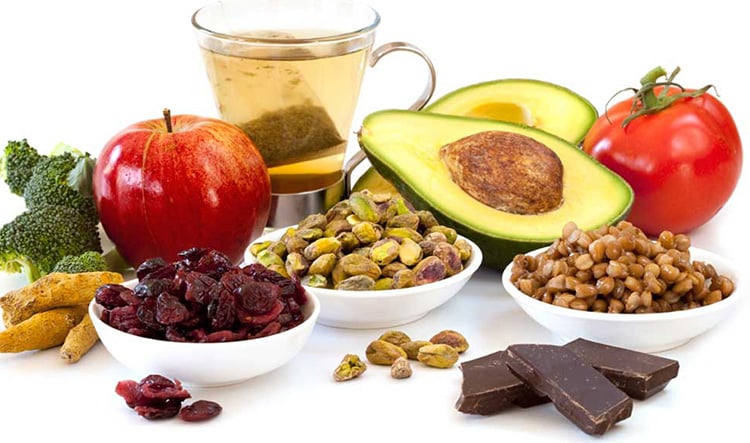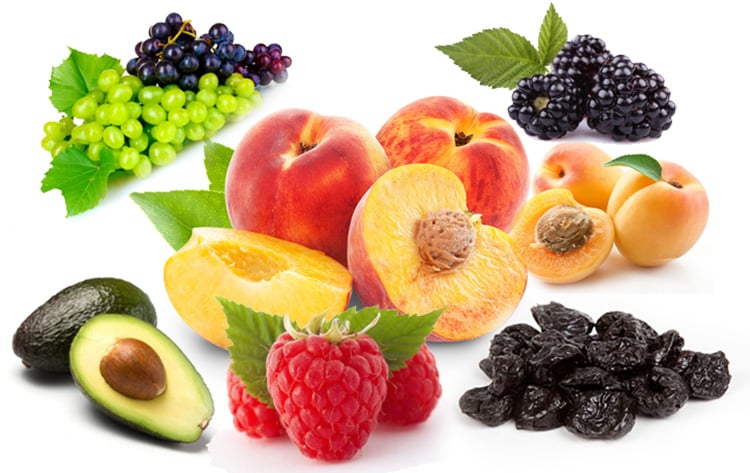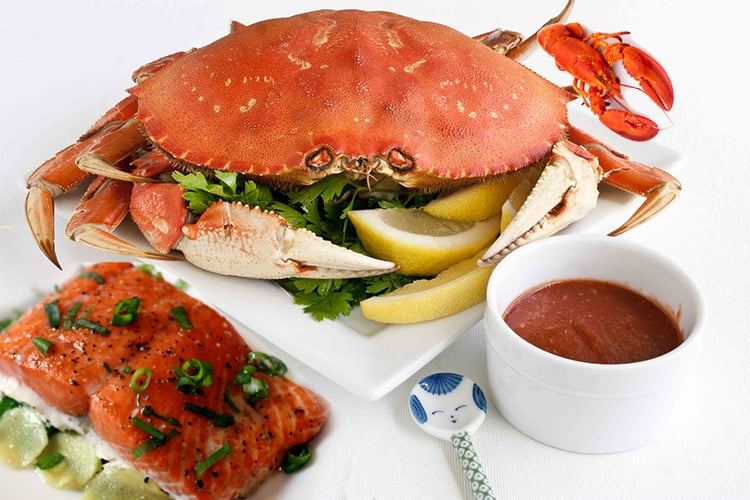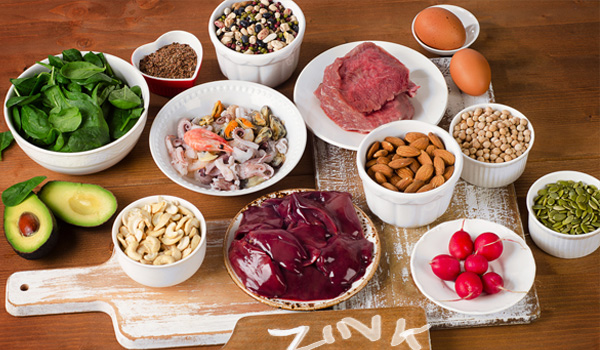
Did you know that the human body contains zinc? Yes, zinc is a very important mineral that our body contains and in fact is essential for us. Though we need it in minimal amounts only, this mineral ensures that we remain healthy (it affects our immune system) and helps in the healing process of wounds.
From nourishing our skin to benefiting our overall health, having zinc either as a supplement or inculcating zinc-rich foods in our diet is very essential. But one important thing to consider is that you should never take zinc supplements without the prescription of a doctor, because too much zinc can also be bad for you and might give you certain side effects.
In this article we will talk all about zinc and zinc-rich foods and how best to incorporate zinc in our bodies:
How Much Intake Of Zinc Per Day Is Good?
A research conducted by the Institute of Medicine’s Food and Nutrition Board says that the tolerable upper intake level of zinc for healthy adults (>19 years) is 40 milligrams. When we say the tolerable upper intake level, or UL, it means the maximum amount of a nutrient that a human can consume without facing dangerous side effects.
For an adult who would be taking more than 40 milligrams of zinc daily, it might lead to side effects. For children between 9 -13 years, having more than 23 milligrams of zinc is dangerous. For adolescents between the ages of 14-18, the UL is not more than 34 milligrams daily.
Now that you know the correct dosage of zinc you should be having in your daily diet, here’s a list of foods that will help you get the required minerals in your body.
Zinc-Rich Foods list
Thank god for us, zinc-rich food is not just limited to meat! Vegetarians can rejoice too because there are a lot of veggies that essentially contain a good amount of zinc.
Zinc Rich Foods For Vegetarians
Here’s a complete list of zinc-rich foods, exclusively for our vegetarian friends.

Zinc-Rich Vegetables
There is no dearth of vegetables that are rich in zinc. Here are ten such veggies that you can incorporate in your diet:
1. Lentil Sprouts
Lentils are a great snack and are very low on calories. So if you are on a diet, you can have these sprouts and at the same time, get your daily dose of zinc!
| Lentil Sprouts | |
|---|---|
| Zinc (in 100g) | DV (in 100g) |
| 1.6mg | 11% |
2. Cabbage
We Indians love cabbage curry and good for us; it contains a good dose of zinc too!
| Cabbage | |
|---|---|
| Zinc (in 100g) | DV (in 100g) |
| 3.75mg | 25% |
3. Palm Hearts
Palm hearts is a vegetable that is not readily available or used by us Indians but is a great source of zinc. It is mainly used in salads and can be found in most grocery supermarkets.
| Palm Hearts | |
|---|---|
| Zinc (in 100g) | DV (in 100g) |
| 1.6mg | 11% |
4. Green Peas
Peas are also a great source of zinc and in most Indian dishes, we use peas generously. So whether you are having it raw or using it in carrot curry or with Paneer, you will get a good amount of zinc by having peas in your daily diet.
| Green Peas | |
|---|---|
| Zinc (in 100g) | DV (in 100g) |
| 1.19mg | 8% |
5. Fireweed Sprouts
Again, this one is a little uncommon but is a good source of zinc. It’s used in salads and is available mostly in hilly regions of the country.
| Fireweed Sprouts | |
|---|---|
| Zinc (in 100g) | DV (in 100g) |
| 12.66mg | 18% |
6. Lemongrass
Lemongrass is mostly used in Thai dishes for a fresh and lemony flavor. Not only is it refreshing, but it also cools your body and gives it a healthy burst of zinc.
| Lemongrass | |
|---|---|
| Zinc (in 100g) | DV (in 100g) |
| 2.23mg | 15% |
7. Shiitake Mushrooms
Shiitake mushrooms taste a lot like meat and are used mostly in non-vegetarian Chinese dishes too. But the zinc is mostly released when they are used without salt.
| Wasabi Roots | |
|---|---|
| Zinc (in 100g) | DV (in 100g) |
| 1.62mg | 11% |
Incorporating these veggies in your diet for a healthy dose of zinc is very important but not just vegetables, there are a lot of fruits that too are rich sources of zinc.
[sc:mediad]
Zinc-Rich Fruits

1. Apricots (In dried form)
Dried apricots are a great snack and can be incorporated in your diet in the form of breakfast topping too. Use on top of oats for a wonderful flavor. Apricots in dried form can also be munched.
| Apricots (In dried form) | |
|---|---|
| Zinc (in 100g) | DV (in 100g) |
| 1mg | 7% |
2. Dates
Not only are they a great substitute for sugar, they are also a great diet food because they keep you full for a longer period of time
| Dates | |
|---|---|
| Zinc (in 100g) | DV (in 100g) |
| 0.29mg | 2% |
3. Peaches
They may not be your favourite fruit because sometimes they are so tangy, but it can give you a good and healthy dose of zinc. You can also have it in its dried form!
| Peaches | |
|---|---|
| Zinc (in 100g) | DV (in 100g) |
| 0.7mg | 5% |
4. Raspberries
The beautiful-looking fruit can be munched, squeezed into juices and sauces or even had as toppings.
| Raspberries | |
|---|---|
| Zinc (in 100g) | DV (in 100g) |
| 0.42mg | 3% |
5. Prunes
Prunes or dried plums also make a great munching food and can be a great substitute for when you are trying to cut down sugar from your diet.
| Prunes | |
|---|---|
| Zinc (in 100g) | DV (in 100g) |
| 0.75mg | 15% |
6. Avocados
The healthy-eating community is bonkers over this fruit because of the innumerable health benefits it has. From being a great source of protein to a good source of zinc, this little fruit is expensive and yet has many fans!
| Avocados | |
|---|---|
| Zinc (in 100g) | DV (in 100g) |
| 0.68mg | 5% |
7. Blackberries
If you are a fan of its red brother, you are going to love blackberries as well.
| Blackberries | |
|---|---|
| Zinc (in 100g) | DV (in 100g) |
| 0.53mg | 4% |
8. Grapes
Grapes are our favourite fruit when it comes to getting the daily dose of zinc supplements. Grapes are healthy and you can munch on them as a snack too. They are quite filling!
| Grapes | |
|---|---|
| Zinc (in 100g) | DV (in 100g) |
| 2.23mg | 4% |
9. Bananas
Have a banana smoothie, use it in your oats or just gulp it down as breakfast- it is sure to fill you up
| Bananas | |
|---|---|
| Zinc (in 100g) | DV (in 100g) |
| 2.23mg | 4% |
10. Figs
Figs are great as a topping on fruit salad and can give you a great burst of nutrients and minerals.
| Figs | |
|---|---|
| Zinc (in 100g) | DV (in 100g) |
| 0.55mg | 4% |
Fruits and vegetables are great sources of zinc, but a vegetarian’s diet is not only about these. They also need others in their diet that are rich in zinc and other minerals. Here are some other items that a vegetarian can include in his/her diet to get their regular supply of zinc.
1. Beans (Legumes like Kaupi, Kidney Beans or Rajma, Chickpeas etc.)
One serving of zinc (roughly one cup, before cooking) can give you as much as 5.8mg of zinc. We Indians cook beans in a wide variety of delicious ways including our favourite rajma-chawal or chana masala. These can be a very good source of essential nutrients in a vegetarian’s diet.
| Beans | |
|---|---|
| Zinc (in 100g) | DV (in 100g) |
| 5.8mg | 11% |
2. Tofu or Paneer made from Soya
For most vegans, this is the equivalent to cottage cheese and sometimes makes a great substitute too. It is a very condensed form of protein and can be a great source of zinc. A half-cup of tofu contains about a 2mg of zinc.
| Tofu | |
|---|---|
| Zinc (in 100g) | DV (in 100g) |
| 2mg | 11% |
3. Lentils (Different types of dal)
We have so many different types of dal in our everyday diet and for a vegetarian or a vegan; this one is an excellent source of zinc. Even if you have half a cup of lentils, this will give you a 1.3mg of zinc in one go. You can add it in soups or toss them with some veggies to make a vegetable stew or dal.
| Lentils | |
|---|---|
| Zinc (in 100g) | DV (in 100g) |
| 1.3mg | 7% |
4. Nuts (Cashews, Almonds etc.)
Nuts are again a rich source of zinc and can be had in multiple ways including roasted and salted forms. Some people even soak them overnight and have them as snacks. Cashews provide 1.3mg of zinc per serving and Brazil nuts have 1.2mg per ounce.
| Nuts | |
|---|---|
| Zinc (in 100g) | DV (in 100g) |
| 1.3mg | 7% |
5. Grains
Oatmeal is a favorite with people who are on a diet because not only does it contain zinc, but also the fiber-rich food keeps you full for longer and speeds up your metabolism.
| Grains | |
|---|---|
| Zinc (in 100g) | DV (in 100g) |
| 3mg | 11% |
6. Seeds
Pumpkin seeds, chia seeds, flaxseeds and sunflower seeds are all a vegetarian’s holy grail of zinc. Most of them are used when a person is on a diet, but you can even munch on them when not on a diet!
¼ cup of sunflower seeds will give you about 1mg of zinc and 1 ounce of chia seeds will give you about 1mg too.
| Seeds | |
|---|---|
| Zinc (in 100g) | DV (in 100g) |
| 1mg | 4% |
7. Dairy Products
If you are not a vegan, dairy products can bring you closer to your daily dose of zinc. Cheese, milk, cottage cheese, yogurt etc. contain roughly about 2.2mg of zinc per serving. Isn’t that a rich source? Most vegetarians can get about half of their daily serving of zinc by consuming dairy products.
| Dairy Products | |
|---|---|
| Zinc (in 100g) | DV (in 100g) |
| 2.2mg | 5% |
8. Broccoli
We didn’t mention broccoli in the list of vegetables, but this one too is a rich source and is a complete food too. Steam or pan-fry and eat it for best results. Raw and chopped, about a cup of broccoli has 0.4mg of zinc.
| Broccoli | |
|---|---|
| Zinc (in 100g) | DV (in 100g) |
| 0.2mg | 2% |
9. Miso
Miso is also a great source of zinc and is made by fermenting soybeans. It is a thick paste-like substance that can be salty and also tangy. It can be had similar like hummus or you can even make soup out of it. One tablespoon of Miso can give you a whopping 0.4mg!
| Miso | |
|---|---|
| Zinc (in 100g) | DV (in 100g) |
| 7mg | 5% |
10. Wheat Germ
Wheat germ is the most vitamin- and mineral-rich part of the wheat kernel. As a matter of fact, the wheat germ is actually the embryo of the wheat plant and thus is mineral rich. It contains a subsequent amount of zinc and can be consumed as a part of a vegetarian’s diet.
| Wheat Germ | |
|---|---|
| Zinc (in 100g) | DV (in 100g) |
| 16.7mg | 13% |
Phew! Now that was an exhaustive list for vegetarians. Now let’s start with the list for our non-vegetarian friends:
Zinc Rich Foods for Non-Vegetarians
For zinc- rich non-vegetarian food items, there are many options for meat-eaters to chose from.
Meats Rich In Zinc
Here is the list of meats that are rich in zinc and can be included in your diet:
1. Beef (Especially lean)
Beef is world’s most popular red meat and is a great source of zinc too. Even though it is a pretty popular red meat, you shouldn’t have too much of it because it not only heats up your body but is also hard on your liver. If you do want to have a lot of it, please stick to lean beef
| Beef | |
|---|---|
| Zinc (in 100g) | DV (in 100g) |
| 12.3mg | 82% |
2. Lamb
Another popular red meat, lamb is a little easier to digest than beef and can be cooked in a wide variety of ways too.
| Lamb | |
|---|---|
| Zinc (in 100g) | DV (in 100g) |
| 5mg | 33% |
3. Pork
Considered as one of the tastiest kinds of meat, incorporating pork in your diet will certainly bring back a lot of zinc to your body.
| Pork | |
|---|---|
| Zinc (in 100g) | DV (in 100g) |
| 14.2mg | 94% |
4. Chicken
You have the widest possible combinations with chicken and starting from salads to cutlets and drumsticks, you sure can get quite a lot of zinc from a chicken dish!
| Chicken | |
|---|---|
| Zinc (in 100g) | DV (in 100g) |
| 2.75mg | 15% |
5. Turkey
Mostly reserved for eating during the Easter season and sometimes used in sandwiches, turkey meat is also high in zinc.
| Turkey | |
|---|---|
| Zinc (in 100g) | DV (in 100g) |
| 3.09mg | 19% |
Not all non-vegetarians eat the meats that are listed above and some of us may just have one or two of the options. But remember, zinc is also present in a lot of vegetables, fruits and other items. So along with the meats, make sure you do include them in your diet. Let’s also check out some seafood items rich in zinc:
Seafood Rich In Zinc

1. Cooked Oysters
Broiled, baked or tossed in chowder, oysters are hands down the best source of zinc in our seafood list. But be really careful while gulping down these slippery delicacies – if not cooked well, these can also be a source of food poisoning.
| Cooked Oysters | |
|---|---|
| Zinc (in 100g) | DV (in 100g) |
| 16mg | 98% |
2. Crabs
Most of you might cringe at the thought of chowing down on something that has six legs and even claws, but this particular item has a lot of zinc in it and is amazing to taste. Add it in your sandwich or have some as a crab curry for your daily dose
| Crabs | |
|---|---|
| Zinc (in 100g) | DV (in 100g) |
| 4.7mg | 23% |
3. Lobsters
Another seafood with legs, but trust us, this is tastier and contains your daily requirement of calcium and Vitamin B12 too.
| Lobsters | |
|---|---|
| Zinc (in 100g) | DV (in 100g) |
| 3.7mg | 13% |
4. Salmon
The healthiest seafood in our list, salmons are a powerhouse of important nutrients and minerals.
| Salmon | |
|---|---|
| Zinc (in 100g) | DV (in 100g) |
| 0.64mg | 4% |
5. Shrimps
Not only are they tiny storages of protein, but they are also rich in zinc and antioxidants, thus making it a superfood!
| Shrimps | |
|---|---|
| Zinc (in 100g) | DV (in 100g) |
| 1.34mg | 7% |
So those are all the different kinds of food that can give you your daily dose of zinc. There are hundreds of awesome benefits of zinc. Below are some of the ways having zinc in your diet can improve your overall health.
Health Benefits Of Zinc:
- Increases your immunity and helps you fight against various diseases. Zinc is also used as an over the counter medicine to fight cold. A lot of doctors prescribe zinc lozenges for those who frequently get colds.
- Zinc is also used for treating diarrhoea and zinc tablets are especially prescribed for children in the third world countries to fight diarrhoea which sometimes ends up killing children.
- Zinc is an important constituent in a large number of enzymes and this helps to regulate cell growth, synthesis of protein in our bodies and also maintains the hormonal levels.
- It has been found out recently that zinc is an anti-oxidant and contains certain compounds that might combat cancer. The research is still ongoing, but scientists have a lot of hope from zinc and its supplements.
Not only your overall health, but zinc can also drastically change the way your skin looks. Here are the benefits of zinc for your skin.
Benefits Of Zinc For Skin:
- Acne Warrior: Yes, you heard that right- Zinc supplements can actually calm down your acne and fight against the pimple-causing bacteria to give you smooth and pimple-free skin. It also balances your hormones and as a result, your acne is typically calmer
- Healing Touch: Zinc potions can also speed up the healing process and helps make new cells for faster healing. Your new skin looks rejuvenated and fresh!
- Antioxidant: As mentioned above, it is a power antioxidant that helps fight free radicals on your skin. These radicals can make you look older than you are.
Zinc supplements can also help your hair’s growth and health. Here is how:
[Also Read: Top 10 Younger Skin Foods For A Healthier You]
Benefits Of Zinc For Hair:
- Combats Hair Loss: Deficiency of zinc in your diet can cause the hair protein to break down and hence leads to hair loss. Having zinc back in your diet will strengthen your roots and hair
- Regrowth: For those battling with balding, zinc supplements can be extremely good for regrowth.

Health Hazards Due To Deficiency Of Zinc
Zinc has amazing benefits for your entire body, and sometimes deficiencies can debilitate your body. Here are some of the health hazards that may be caused due to deficiency of zinc:
- Your neurological function is affected and there might be motor coordination difficulties too
- You might also have difficulty in fighting against diseases. Zinc deficiency will cause your hormones to fluctuate and cause other bodily problems too.
- Chronic stress due to deficiency might also lead your body to develop different kinds of allergies. What this means is that you will be frequently falling sick and anything and everything might cause allergies for you
- Zinc deficiency might also break down your hair’s protein follicles and thus your hair might thin down and your might start losing your hair
Zinc is a very important part of our diet and we should definitely incorporate it in our diet in as many ways as possible.
Images Source: pinterest
